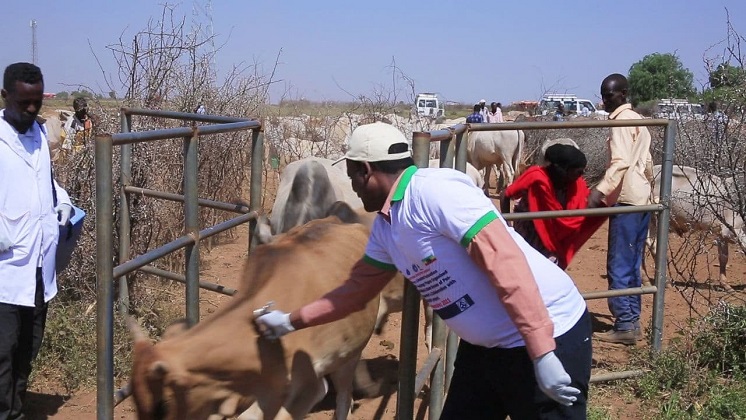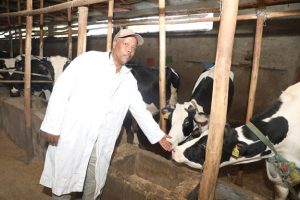
Ethiopia has the largest number of livestock in Africa. According to recent Ethiopian Statistics Agency data, Ethiopia has over 61 million cattle. In Ethiopia’s livestock resource, the nomadic and semi-nomadic societies have the largest number of the livestock production.
The livestock resource for the nomadic, semi-nomadic and the agrarian society in Ethiopia is the source of the people livelihood sometimes the only source of their livelihood especially in the nomadic and semi-nomadic areas. Protecting the health and safety of the livestock if maintaining the social and economic livelihood of the societies and maximizing the income of the country from the livestock production.
Ethiopia collaborating with Kenya has started cross border animal disease vaccination campaign in border areas that is planned to vaccinate all livestock animals across Ethiopia and Kenya borders mainly to prevent cross border animal diseases collaborating with Kenya.
Animal Disease Prevention and Control Director at Ethiopian Ministry of Agriculture, D/r Wubshet Zewde told The Ethiopian Herald that Ethiopia and Kenya are conducting animal vaccination campaign focusing on the nomadic society of the border areas.
Ethiopia and Kenya has agreed to prevent cross-border animal disease in 2015 jointly in the shared border areas. The joint agreement between the two countries is to conduct joint animal disease prevention vaccination campaigns and animal related disease surveys and other related tasks to protect the health and safety of animals in the border areas.
According to Dr. Wubshet on Ethiopian side, the border area includes from Afar border areas up to South Omo where huge livestock resource is available. The nomadic society is mobile including crossing the border areas of countries in search of water and grazing land for their animals. Due to mobility from place to place, especially crossing borders of countries, cross-border diseases can be easily transmitted.
Hence, he said, the agreement with Kenya aims to conduct regular surveys to protect the health of animals, to hold joint vaccination programs annually so as to reach all nomadic societies in both countries without and to strengthen their capacity of preventing animal diseases in the border areas. Based on the agreement, Dr. Wubshet said, Ethiopia and Kenya were started the cross-border animal vaccination program in 2019 targeting the border areas between the two countries. But due to the outbreak of COVID-19, in 2020, the vaccination was interrupted.
Wubshet said that the 2021 cross-border animal vaccination campaign was already launched adding Ethiopia planned to vaccinate over 5.4 million livestock across the border with Kenya.
The vaccination includes cattle, goat, sheep and camels with five vaccination types across the border areas of the two countries. The vaccination campaign was started in Moyale area of Oromia region, Dr. Wubshet stated adding expanded to Somali Region border areas and now to South Omo border areas and the vaccination campaign will resume sustainably to the remaining border areas.
For Wubshet the Ethio-Kenya cross-border vaccination program is underway based on memorandum of understanding signed between the two countries for the sustainable prevention and control of cross border animal diseases effectively which is already started. In the future, Ethiopia is planning to seal an agreement with all its neighboring countries to conduct similar tasks so as to make the livestock safe in all border areas with Sudan, Somalia, Djibouti and so on.
During the launching ceremony of the vaccination program, Advisor to Livestock Sector State Minister at Ethiopia Ministry of Agriculture Dr. Yohannes Girma on his part noted that the synchronized animal vaccination program between Ethiopia and Kenya is to cover all border areas within the two countries to vaccinate nomadic society animals aiming at disease prevention.
“Pastoralists especially during droughts move from both sides without restriction” Yohannes said adding “diseases that are available in one side can easily transmit to other areas and can affect the livestock.” For him the livestock is everything for the nomadic and semi-nomadic society and preventing the livestock from disease if protecting the livelihood of the people. In addition, improving the health and safety of livestock can improve the general economy of both countries.
Improving the health of the livestock can improve the livelihood of the nomadic society, beyond that it can help to develop the national economy in general by increasing the production and productivity of the sector.
Dr. Wubshet on his part argued that though Ethiopia is the largest livestock producer in Africa, its economic gain from the sector is yet undeveloped. To develop the economic benefit of the livestock sector, he added, the first step is protecting the health and safety of the animals so as to compute in the international market. In addition, it would help the productivity of the sector by developing the production capacity of the livestock.
In addition to protecting the health of the livestock and improving lifestyle of the pastoralist society, vaccinating animals would help to control communicable diseases. For him up to 70 percent of human disease causes is from animal disease. Hence, indirectly, controlling communicable animal diseases can help control some communicable human diseases. The vaccination campaign for him has multidimensional advantages economically, in improving the livelihood of the society and in preventing some transmittable human diseases.
“So far over one million livestock are vaccinated in the border areas” Dr. Wubshet noted adding that “Ethiopia plans to vaccinate over 5.4 million livestock across the border areas from South Omo to Afar” In the future, Ethiopia’s plan is to work with all neighboring countries in preventing cross border animal diseases across its borders.
If any animal disease is reported in one country, exporting animal products is difficult in international market, Wubshet stated adding that protecting health of the livestock is the only solution to maximize the economic gain and to become competitive in the international market of animal precuts market. Controlling animal diseases can improve the market competition for one country and Ethiopia is working to exploit its comparative advantage in the sector since it has huge potential in livestock sector.
For the Director, beyond vaccinating animals, Ethiopia is working to maximize the livestock production and productivity by improving the local livestock species with researches. The researches focus on multiplying, improving and maintaining the best livestock species for better productivity.
BY DARGIE KAHSAY
The Ethiopian Herald 23 November 2021




